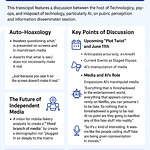This episode explores the blurring lines between reality and staged events, particularly within the context of professional wrestling and media narratives. The speaker analyzes a wrestling incident, arguing it was kayfabe (staged to appear real) despite popular belief and official reports claiming a real escalation. This analysis extends to a broader critique of how mainstream media manipulates public perception through "psyops" and "concurrent programming," citing examples like the Will Smith slap and political assassinations.
The discussion emphasizes the importance of skepticism and critical thinking when encountering viral content and official narratives, highlighting how readily people accept information as real without sufficient evidence. Ultimately, the text suggests that this widespread gullibility contributes to the power of the "psyop entertainment complex" in shaping societal beliefs and controlling public discourse.
The IPS DEPROGRAM is primarily aimed at "taking people out of the mind war" and helping them to discern reality from staged events and manipulative narratives. The objective is to provide "clarity" and "unmenduzl[e]" individuals who might otherwise be "cognitively sabotaged" into believing that "everything is fake." This approach challenges the "blind faith" people place in media, which assumes that "the screen is somehow a window to the real world," a "major vulnerability that's exploited every single day."
A key concept within this deprogram is kayfabe, defined as "the portrayal of staged events within professional wrestling as real." It serves as a "code for maintaining a pretense of reality in front of an audience." The speaker asserts that "more people are kayfabe oriented than objectivists," indicating a widespread tendency to accept staged events as real.
The relevance of kayfabe to the IPS DEPROGRAM is highlighted through several points:
Blurring Reality: Kayfabe is seen as a mechanism that "blurs rather real and fake." The speaker believes that people agreeing something is real or fake "depending on whether it's designated as such" is a "clear example" of kayfabe in action.
Challenging Assumptions: The deprogram encourages questioning events that are presented as real, especially when they occur within contexts known for staging, like professional wrestling. The speaker states, "given that it's part of the wrestling infrastructure itself, why would I assume this is real?"
Recognizing Psyops: Kayfabe is viewed as a tool used in "psyops" to test "whether people can tell real from fake." The widespread belief in staged events, enabled by kayfabe, "doesn't bode well for the future because the majority of media auto believers really dictate what kind of psyops we get and how much power it gives the psyop entertainment complex."
Critical Media Consumption: The deprogram advocates for a default skepticism, asserting that things should be considered "fake until proven real." This involves not relying solely on visual debunking, as visual effects are constantly improving. The goal is to "get better at deconstructing fake news without relying on visually debunking it."
Public reactions, particularly to events like the Raja Jackson/Psycho Stew incident, demonstrate that "wrestling fans are typical of how people process media in general." When Elon Musk states a video is "real," despite it appearing fake, he is "gaslighting" the audience, "dominating your perceptions," and making people "outsource" their ability to differentiate reality from fakery. This "gaslighting and the misinformation effect are really built into the mainstream mediation process."












